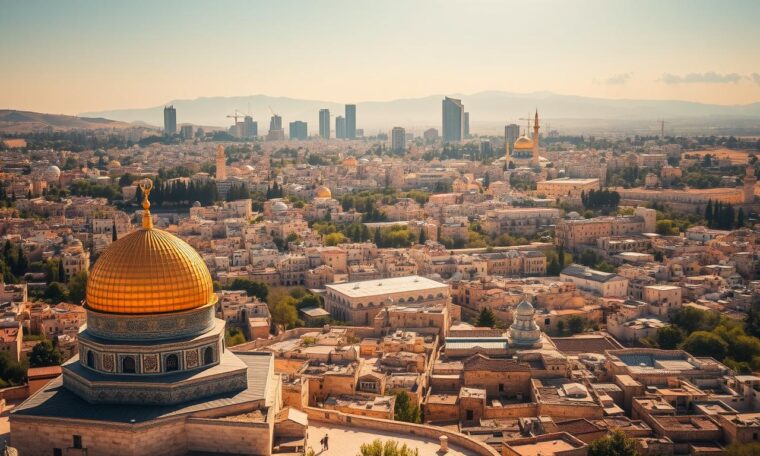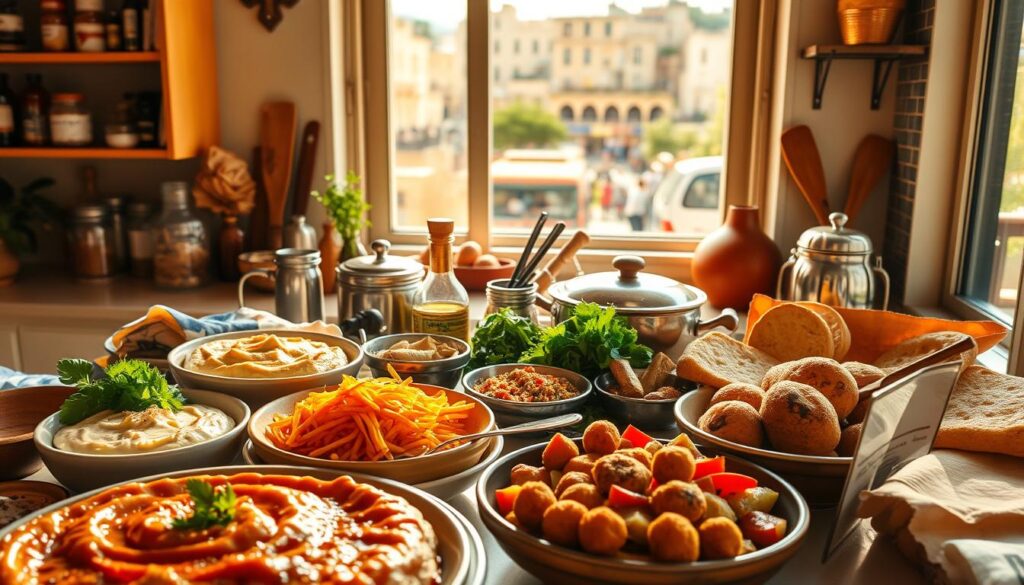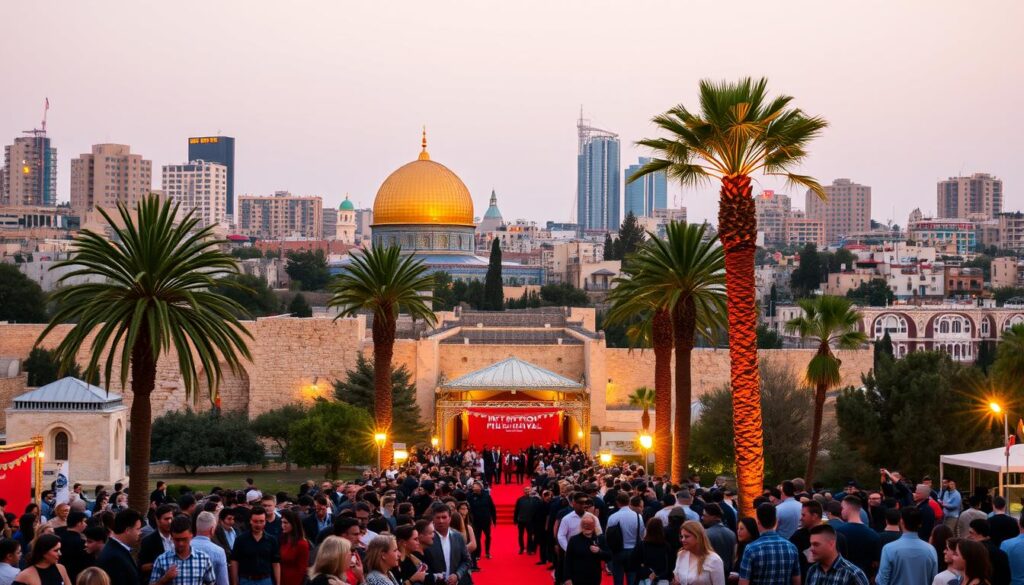
Jerusalem, a city steeped in history and culture, is a must-visit destination for any traveler. With its ancient landmarks, vibrant markets, and diverse cultural influences, Jerusalem offers a unique experience that blends tradition and modernity.
Visitors can explore the city’s rich heritage by visiting famous sites, sampling local cuisine, and navigating the city’s efficient transportation system. Whether you’re interested in history, culture, or simply experiencing the beauty of Jerusalem, this city has something to offer.
Key Takeaways
- Discover Jerusalem’s ancient landmarks and historical significance
- Experience the city’s vibrant culture and traditions
- Explore local cuisine and markets
- Learn about the city’s diverse cultural influences
- Navigate Jerusalem’s efficient transportation system
The Sacred Land Where History Comes Alive
With its rich tapestry of historical and cultural significance, Jerusalem is a city that seamlessly weaves together the old and the new. This ancient city has been a focal point for various civilizations, each leaving its mark on the city’s landscape.
A Crossroads of Civilizations
Jerusalem’s history spans over 3,000 years, with evidence of human habitation dating back to the 4th millennium BCE. Throughout its history, the city has been influenced by numerous cultures, including the Canaanites, Israelites, Romans, and Ottomans, making it a true crossroads of civilizations.
The Unique Blend of Ancient and Modern
The city’s unique blend of ancient and modern is evident in its architecture, cultural practices, and daily life. From the ancient walls of the Old City to the modern skyscrapers of West Jerusalem, the city presents a fascinating contrast of old and new.
The blend of cultures and historical periods is also reflected in the city’s culinary scene, festivals, and cultural events, making Jerusalem a vibrant and dynamic destination.
| Civilization | Contribution | Legacy |
|---|---|---|
| Israelites | Religious significance | The Western Wall |
| Romans | Architectural influence | The Cardo |
| Ottomans | Cultural exchange | The Mahane Yehuda Market |
Jerusalem: The Eternal City at Israel’s Heart
For thousands of years, Jerusalem has been a beacon of spiritual significance, drawing pilgrims and visitors from around the world. This city is not only a geographical center but also a symbolic heart of Israel, pulsating with history, faith, and culture.
Three Thousand Years of Continuous History
Jerusalem’s history is a long and complex tapestry, woven from the threads of numerous civilizations and empires. With roots dating back over three millennia, it has been a city of significance since ancient times. It has seen the rise and fall of kingdoms, the birth of religious movements, and the clash of cultures.
The city’s strategic location has made it a prized possession throughout history, with various rulers leaving their mark on its architecture, culture, and religious practices.
Religious Significance Across Faiths
Jerusalem holds a unique position in the religious landscape of the world, being considered holy by Jews, Christians, and Muslims. Each of these faiths has significant sites within the city that are central to their beliefs and practices.
Judaism’s Holiest City
For Jews, Jerusalem is the holiest city, the site of the Temple Mount where the First and Second Temples once stood. The Western Wall, a remnant of the Second Temple, is a focal point of Jewish prayer and pilgrimage.
Christian Pilgrimage Destination
Christians revere Jerusalem as the city where Jesus preached, was crucified, and resurrected. The Church of the Holy Sepulchre is one of the most important pilgrimage sites, believed to be the location of Jesus’ burial and resurrection.
The Third Holiest Site in Islam
In Islam, Jerusalem is considered the third holiest city after Mecca and Medina. The Dome of the Rock and Al-Aqsa Mosque, both located on the Temple Mount, are significant sites. Muslims believe that the Prophet Muhammad ascended to heaven from this location.
Jerusalem’s religious significance is a powerful draw for visitors, offering a glimpse into the rich spiritual heritage of the region.
Essential Historical Sites in Jerusalem’s Old City
The Old City of Jerusalem is a labyrinth of ancient history, where every stone tells a story of faith and heritage. This walled city is home to some of the most significant religious sites in the world, attracting pilgrims and tourists alike.
The Western Wall and Temple Mount Complex
The Western Wall, also known as the Wailing Wall, is a sacred site in Judaism, representing the last remaining wall of the Second Temple. The Temple Mount Complex, where the Western Wall is located, is also home to the Dome of the Rock and Al-Aqsa Mosque, making it a site of immense religious significance.
Visiting Protocols and Best Times
Visitors to the Western Wall should dress modestly and be respectful of worshippers. The best time to visit is early morning or late afternoon to avoid the crowds. It’s also advisable to check the visiting hours and protocols for non-Jewish visitors to the Temple Mount.
The Church of the Holy Sepulchre
The Church of the Holy Sepulchre is one of the most revered sites in Christianity, believed to be the location of Jesus Christ’s crucifixion, burial, and resurrection. This complex is shared by several Christian denominations, each having its own chapel and rituals.
The Dome of the Rock and Al-Aqsa Mosque
The Dome of the Rock and Al-Aqsa Mosque are significant sites in Islam, located on the Temple Mount. The Dome of the Rock is an architectural marvel with its golden dome, while Al-Aqsa Mosque is one of the holiest sites in Islam.
Via Dolorosa: Walking the Stations of the Cross
Via Dolorosa, meaning ‘Way of Sorrow,’ is the path Jesus is believed to have walked on his way to crucifixion. Pilgrims and visitors can walk this ancient route, stopping at the Stations of the Cross, a poignant experience that retraces the final steps of Jesus.
Jerusalem’s Old City is a treasure trove of historical and religious sites, each with its own story and significance. Visitors can explore these sites to gain a deeper understanding of the city’s rich history and cultural heritage.
Discovering Jerusalem’s Four Quarters
As you step into Jerusalem’s Old City, you’re immediately immersed in the diverse atmospheres of its four quarters. Each quarter has its own unique character, reflecting the complex history and cultural richness of the city.
The Jewish Quarter and Its Synagogues
The Jewish Quarter is home to some of the most significant historical sites in Jerusalem, including the Western Wall and numerous ancient synagogues. The quarter is characterized by its narrow streets and closely packed buildings, giving visitors a glimpse into traditional Jewish life.
The Muslim Quarter’s Vibrant Souks
The Muslim Quarter is known for its bustling markets, or souks, where visitors can find everything from spices to handmade crafts. This quarter is a sensory experience, with its vibrant colors, enticing aromas, and lively atmosphere.
The Christian Quarter’s Religious Treasures
The Christian Quarter is a hub of religious significance, housing important sites such as the Church of the Holy Sepulchre. Pilgrims and tourists alike visit this quarter to explore its historic churches and monasteries.
The Armenian Quarter’s Unique Heritage
The Armenian Quarter, though the smallest, is rich in history and culture. It is home to the Armenian Patriarchate and several historic churches, showcasing the unique heritage of the Armenian community in Jerusalem.
| Quarter | Main Attractions | Cultural Significance |
|---|---|---|
| Jewish Quarter | Western Wall, Synagogues | Center of Jewish life and worship |
| Muslim Quarter | Souks, Mosques | Vibrant commercial and religious hub |
| Christian Quarter | Church of the Holy Sepulchre | Important pilgrimage site |
| Armenian Quarter | Armenian Patriarchate, Churches | Preserves Armenian heritage |
Modern Attractions in Israel’s Capital
Modern Jerusalem is a city of contrasts, where historical landmarks stand alongside cutting-edge museums and entertainment venues. This blend of old and new makes Jerusalem a fascinating place to explore, with a plethora of modern attractions that cater to diverse interests.
Yad Vashem: Israel’s Holocaust Memorial
Yad Vashem is a poignant reminder of the Holocaust’s impact, serving as Israel’s official memorial to the victims. The complex includes a museum, a memorial hall, and a visual center, providing a comprehensive and moving experience. As David Friedman, a Holocaust survivor, once said, “The memory of the Holocaust is a warning to us all.”
The Israel Museum and the Dead Sea Scrolls
The Israel Museum is a treasure trove of art, archaeology, and history, housing the famous Dead Sea Scrolls. The museum’s vast collections and interactive exhibits make it a must-visit for anyone interested in the region’s rich cultural heritage. The Dead Sea Scrolls, in particular, offer a unique glimpse into the history of Judaism and early Christianity.
Machane Yehuda Market: From Day to Night
Machane Yehuda Market, or “The Shuk,” is a vibrant hub of activity, transforming from a bustling marketplace by day to a lively nightlife destination. Visitors can sample local delicacies, browse the stalls, and enjoy the lively atmosphere, making it an ideal spot to experience Jerusalem’s contemporary culture.
The First Station and Modern Entertainment
The First Station is a restored Ottoman-era train station turned entertainment complex. It offers a range of activities, including dining, shopping, and cultural events. This complex is a great example of how Jerusalem blends its historical heritage with modern entertainment options, providing something for everyone.
Jerusalem’s modern attractions showcase the city’s ability to evolve while respecting its historical roots. From memorials and museums to markets and entertainment venues, there’s no shortage of exciting experiences to be had in Israel’s capital.
The Rich Culinary Landscape of Israel
From the ancient streets of Jerusalem to the modern cities, Israel’s food scene is a journey through flavors and cultures. Israeli cuisine is a reflection of its diverse heritage, blending Mediterranean, Middle Eastern, and international flavors.
Traditional Israeli Dishes You Must Try
Israeli cuisine is known for its rich and diverse traditional dishes. Among the must-try foods are hummus, falafel, and shawarma, which have become staples of Israeli street food.
Hummus, Falafel, and Shawarma
These popular dishes are not only delicious but also deeply rooted in Israeli culture. Hummus is a creamy dip made from chickpeas, falafel is crispy, flavorful chickpea patties, and shawarma is a juicy, spit-roasted meat sandwich.
Shakshuka and Israeli Breakfast
Another favorite is shakshuka, a hearty dish of eggs poached in a spicy tomato sauce, often enjoyed during Israeli breakfast, which typically includes a variety of cheeses, salads, and bread.
Jerusalem’s Food Markets and Culinary Tours
Jerusalem’s food markets, such as the famous Machane Yehuda Market, offer a sensory experience, with vendors selling everything from fresh produce to prepared foods. Culinary tours provide a guided exploration of these markets and other local eateries, giving visitors a deeper understanding of Israeli cuisine.
From Street Food to Fine Dining Experiences
Israel’s culinary scene ranges from casual street food to sophisticated fine dining experiences. Restaurants in cities like Tel Aviv and Jerusalem offer innovative, modern takes on traditional dishes, using fresh, locally sourced ingredients.
Israeli Wine and Craft Beer Scene
Israel is also known for its wine and craft beer. The country has a growing wine industry, with many vineyards producing high-quality wines. Similarly, Israeli craft breweries are gaining international recognition for their unique beers.

Exploring Israel’s culinary landscape is a delightful adventure, offering something for every palate. Whether you’re enjoying traditional dishes, exploring food markets, or savoring fine dining experiences, Israel’s diverse cuisine is sure to leave a lasting impression.
Navigating Transportation in Israel
Getting around Israel is relatively easy thanks to its well-developed transportation infrastructure. The country offers a variety of transportation options, making it convenient for travelers to explore its many attractions.
Jerusalem’s Light Rail and Bus System
Jerusalem has a modern light rail system that connects various parts of the city, making it easy to get around without a car. The light rail is complemented by an extensive bus network that covers more areas, including those not reached by the light rail.
Intercity Travel Options
For traveling between cities, Israel has a reliable network of trains and buses. Trains are a comfortable option for longer distances, while buses cover more routes, including those to smaller towns.
Trains Between Major Cities
Israel Railways operates trains between major cities like Tel Aviv, Haifa, and Jerusalem, offering a convenient way to travel long distances.
Bus Services Throughout the Country
Bus companies like Egged and Dan operate extensive networks, connecting cities, towns, and rural areas. Buses are often the most affordable option for travelers.
Rental Cars and Driving in Israel
For those who prefer to drive, rental cars are available at major airports and cities. Driving in Israel can be challenging due to crowded roads, but it offers the flexibility to explore at one’s own pace.
Using Ride-Sharing Apps and Taxis
Ride-sharing services like Gett and Uber are popular in Israel, offering a convenient alternative to traditional taxis. Taxis are widely available but may not always use meters, so it’s advisable to agree on the fare beforehand.
| Transportation Mode | Coverage | Convenience Level |
|---|---|---|
| Light Rail | Jerusalem | High |
| Trains | Major Cities | High |
| Buses | Countrywide | Medium |
| Rental Cars | Countrywide | Medium |
| Ride-Sharing/Taxis | Major Cities | High |
Cultural Experiences and Festivals in Israel
With its unique blend of ancient traditions and modern culture, Israel hosts a variety of cultural experiences and festivals throughout the year. These events not only reflect the country’s diverse heritage but also offer visitors a chance to engage with local customs and contemporary arts.
Religious Celebrations Throughout the Year
Israel is a hub for religious celebrations, with numerous festivals observed with great fervor. Passover, Sukkot, and Hanukkah are significant Jewish holidays that are celebrated with traditional rituals and festivities.
Passover, Sukkot, and Hanukkah
- Passover commemorates the Exodus, with families gathering for a Seder meal.
- Sukkot is celebrated by building and dwelling in Sukkahs, symbolizing the harvest.
- Hanukkah, the festival of lights, is observed by lighting the Menorah for eight days.
Easter Celebrations in Jerusalem
Easter is a significant event in Jerusalem, with Christians from around the world pilgrimaging to the Church of the Holy Sepulchre to mark the resurrection of Jesus Christ.
The Jerusalem International Film Festival
The Jerusalem International Film Festival is a premier event in the global film calendar, showcasing a diverse range of films from Israeli and international filmmakers. It’s a celebration of cinema that highlights social issues, cultural narratives, and innovative storytelling.
Israel Festival and Contemporary Arts
The Israel Festival is another highlight of the country’s cultural calendar, featuring a mix of music, dance, and theater performances. It showcases both Israeli and international artists, offering a platform for contemporary arts.
Music and Dance Performances
Israel’s vibrant music and dance scene is reflected in its numerous performances throughout the year. From traditional folk dances to contemporary music concerts, there’s always something to enjoy. 
Day Trips from Jerusalem to Explore More of Israel
With Jerusalem as your base, you can easily embark on day trips to some of Israel’s most fascinating destinations. Whether you’re interested in history, nature, or culture, there’s something for everyone just a short journey away.
Floating in the Dead Sea
One of the most popular day trips from Jerusalem is to the Dead Sea, where you can float in its salty waters and enjoy the therapeutic benefits of the mineral-rich mud. The Dead Sea is a unique natural wonder, and its low altitude and serene atmosphere make it a perfect spot to relax.
Masada: The Ancient Fortress in the Desert
Visit the ancient fortress of Masada, a UNESCO World Heritage Site perched atop a rock plateau in the Judean Desert. Take a cable car ride to the top for breathtaking views and explore the well-preserved ruins of this historic site.
Bethlehem and Religious Sites in the West Bank
Take a trip to Bethlehem, a city steeped in religious significance, and visit sites such as the Church of the Nativity. This day trip offers a glimpse into the rich history and culture of the region.
Tel Aviv: Beaches, Bauhaus, and Nightlife
Head to Tel Aviv, Israel’s vibrant coastal city, known for its beautiful beaches, Bauhaus architecture, and lively nightlife. Spend the day exploring the city’s many attractions, from the Carmel Market to the Tel Aviv Museum of Art.
The Sea of Galilee and Northern Israel
Explore the Sea of Galilee and the surrounding region, which is dotted with historic sites and natural wonders. Visit ancient synagogues, take a boat ride on the sea, or simply enjoy the scenic views.
| Destination | Main Attractions | Travel Time from Jerusalem |
|---|---|---|
| Dead Sea | Floating, mud baths, Ein Gedi oasis | 1 hour |
| Masada | Ancient fortress, cable car, desert views | 2 hours |
| Bethlehem | Church of the Nativity, religious sites | 1.5 hours |
| Tel Aviv | Beaches, Bauhaus architecture, nightlife | 1 hour by train |
| Sea of Galilee | Boat rides, ancient synagogues, scenic views | 2.5 hours |
Conclusion: The Timeless Appeal of Israel’s Heritage
Israel’s heritage is a rich tapestry woven from threads of history, culture, and faith, creating a timeless appeal that draws visitors from around the world. The country’s unique blend of ancient traditions and modern life is palpable in Jerusalem, where sacred sites, vibrant markets, and cultural festivals converge.
The cultural significance of Israel lies in its ability to bridge the past and present, offering a glimpse into the lives of people who have shaped the region over millennia. From the sacred walls of the Old City to the innovative spirit of Tel Aviv, Israel’s diverse landscapes and experiences leave a lasting impression on all who visit.
As a melting pot of cultures, religions, and histories, Israel’s heritage continues to captivate and inspire. Whether exploring the ancient ruins of Masada, floating in the Dead Sea, or enjoying the culinary delights of Jerusalem’s markets, visitors are immersed in a world where tradition and modernity blend seamlessly.
